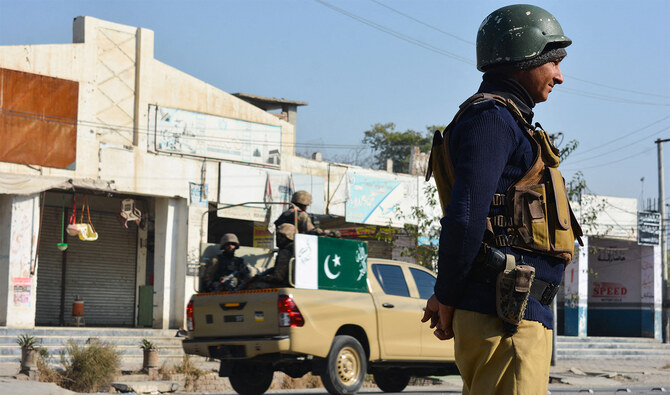ISLAMABAD: Pakistani security forces have killed four militants in two separate operations in the country’s northwest, according to the military’s media wing, Inter-Services Public Relations (ISPR), on Thursday.
The country has witnessed a surge in militant attacks in the tribal districts of Khyber Pakhtunkhwa province since a fragile ceasefire broke down between the proscribed Tehreek-e-Taliban Pakistan (TTP) and the government in November 2022.
Pakistan has frequently said the TTP leadership is based in Afghanistan and gets assistance from the administration in Kabul, though Afghan authorities deny the claim.
“On 9-10 October 2024, four Khwarij [TTP militants] were killed in two separate operations conducted by Security Forces in Khyber Pakhtunkhwa,” the ISPR said.
On October 9, an intelligence-based operation was carried out in the general area of Janikhel in Bannu district in which two militants were killed.
In another operation, conducted in the general area Hassan Khel in North Waziristan on October 10, Pakistani troops effectively engaged a militant hideout and in ensuing exchange of fire two more militants lost their lives.
“Weapons and ammunition were also recovered from killed khwarij, who remained actively involved in numerous terrorist activities against the security forces as well as abductions and target killing of innocent civilians,” the ISPR added.
It said the “sanitization of the area” was being carried out to eliminate any other militant found in the territory.
Security forces kill four militants in Pakistan’s northwest
https://arab.news/4bv6w
Security forces kill four militants in Pakistan’s northwest

- Militants were killed in two separate operations carried out in Bannu and North Waziristan
- Weapons and ammunition were recovered from militants who were involved in several crimes
Bangladesh refuse to go to India for T20 World Cup

- Bangladesh board’s response comes a day after ICC rejected its demand to shift World Cup matches from India to Sri Lanka
- Row erupted in January when India’s cricket board asked IPL franchise to drop Bangladesh player amid political tensions
DHAKA, Bangladesh: Bangladesh will not travel to India to play in next month’s T20 World Cup, its cricket board said on Thursday, effectively ruling the country out of the tournament.
“Our only demand is to play the World Cup — but not in India,” Bangladesh Cricket Board (BCB) President Aminul Islam Bulbul told reporters.
The refusal came a day after cricket’s governing body rejected Bangladesh’s plea to play its games in Sri Lanka instead.
“There is no scope for changing our decision,” said Asif Nazrul, an adviser for youth and sports issues in Bangladesh’s interim government.
The T20 World Cup begins on February 7, with Bangladesh scheduled to play their four group matches in the Indian cities of Kolkata and Mumbai.
The row between the neighboring nations erupted on January 3 when the Indian cricket board ordered the Indian Premier League (IPL) franchise Kolkata Knight Riders to release Bangladesh fast bowler Mustafizur Rahman.
Mustafizur’s removal from the IPL followed online outrage by right-wing Indian Hindus who invoked alleged attacks on a fellow community in Muslim-majority Bangladesh.
Dhaka maintains that Indian media had exaggerated the scale of the violence.
The sport’s global governing body said on Wednesday it had “engaged with the BCB in sustained and constructive dialogue” to ensure Bangladesh could participate in the tournament, but added that those efforts had been “rebuffed.”
The International Cricket Council (ICC) said “independent security assessments, comprehensive venue-level security plans and formal assurances from the host authorities” found there was “no credible or verifiable threat to the safety” of the Bangladesh team.
‘LOSE A HUGE AUDIENCE’
However, Nazrul said Bangladesh’s security concerns “did not arise from speculation or theoretical analysis.”
“They arose from a real incident — where one of our country’s top players was forced to bow to extremists, and the Indian cricket board asked him to leave India,” he said.
Bangladesh will hold elections during the World Cup, its first since a mass uprising in 2024 toppled then-prime minister Sheikh Hasina, a close ally of New Delhi.
Political relations have since soured between Bangladesh and India, where Hasina fled after she was ousted.
There are wider issues for India, which is preparing to host the 2030 Commonwealth Games that are seen as a stepping stone for its ambitions to host the 2036 Olympics.
“Bangladesh is a cricket-loving nation. If a country of nearly 200 million people misses the World Cup, the ICC will lose a huge audience,” the BCB’s Bulbul said.
“Cricket is entering the Olympics in 2028, Brisbane in 2032, India is bidding for 2036. Excluding a major cricket-loving country like Bangladesh would be a failure.”
Bangladesh’s appeal to the ICC was not without precedent, with India’s arch-enemy Pakistan to play all its games in Sri Lanka.
That deal was struck after India, a financial and administrative powerhouse within cricket, refused to travel to Pakistan for the 2025 Champions Trophy and played its matches in Dubai instead.
However, the ICC said a year later a similar shift was impossible for Bangladesh.
“There are many precedents worldwide where matches have been moved to other venues due to security risks,” Bangladesh’s Nazrul said.
ICC sources told AFP this week that Bangladesh could be replaced by Scotland, the highest-ranked team that did not qualify outright for the World Cup.










